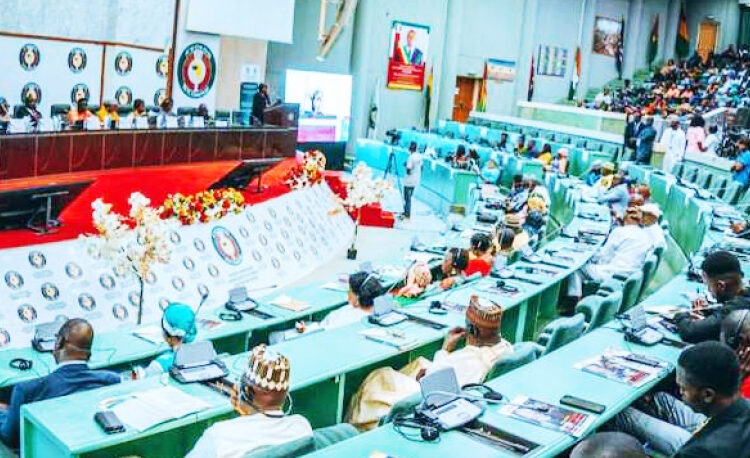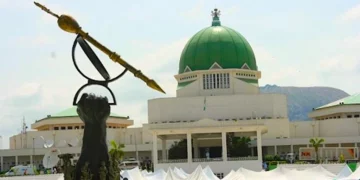By May 28, 2025, the Economic Community of West African States (ECOWAS) will be 50 years old, having been established on that day in 1975.
In its almost five decades of existence, the regional bloc has navigated through the complexities of integration and development.
Fifty years is no small time for an organisation that brought together leaders and countries of different colonial orientations and ideologies.
A reflection on its origins, accomplishments, and challenges has shown that through resilience and unity of purpose among the region’s leaders, ECOWAS has remained a strong voice both in Africa and global affairs.
In the considered opinion of this newspaper, the depletion of its member states is worrisome and must not be allowed to continue because there is strength in numbers.
It is for this reason and many others that we make a clarion call for its reorganisation.
The vision of its founding fathers may appear noble and well-conceived, but changes in the global economy, politics, and technology in recent years have made the review of the original fundamentals imperative.
In fact, the founding fathers of ECOWAS envisioned a region where economic cooperation and integration would enhance development, peace, and stability.
From inception to date, ECOWAS has made giant strides in achieving regional integration, trade liberalisation, free movement of citizens, goods, and services among member states.
It has doggedly pursued a customs union and a single currency, which have remained elusive due to the manipulation and interference of foreign powers.
Indeed, ECOWAS has fared well in the promotion of peace and security in the region. A military task force, the ECOWAS Monitoring Group (ECOMOG), spearheaded by Nigeria helped in the return of peace and stability in Liberia, Sierra Leone, and Guinea-Bissau, which were engulfed in war.
Perhaps the most alarming challenge facing ECOWAS today is the erosion of its membership base. Initially composed of 15 member states, the bloc has seen its ranks shrink to 11, with Niger, Mali, and Burkina Faso being the latest to leave. These departures reflect not only political upheavals but also deeper frustrations with the bloc’s perceived ineffectiveness.
ECOWAS must address this exodus head-on. The strength of any regional organisation lies in its unity, and the loss of member states weakens both its negotiating power and its collective vision. While some blame lies with the departing nations’ political trajectories, ECOWAS must also reckon with its own shortcomings in managing crises and fostering inclusivity.
Under the current chairmanship of Nigerian President Bola Tinubu, ECOWAS has an opportunity to recalibrate. President Tinubu’s decision to settle Nigeria’s long-overdue financial commitments—amounting to ₦85 billion and $54 million—sends a strong signal of Nigeria’s renewed commitment to the bloc. This gesture, particularly in a time of domestic economic hardship, underscores Nigeria’s recognition of ECOWAS’s potential to drive regional progress.
However, financial commitments alone cannot address the bloc’s deeper challenges. Structural inefficiencies, outdated frameworks, and a lack of strategic vision have long hindered ECOWAS’s ability to respond effectively to crises.
Reforming its institutions to ensure greater efficiency, accountability, and responsiveness must be a priority.
Moreover, ECOWAS must work to repair its fractured membership. Engaging Niger, Mali, and Burkina Faso in sincere dialogue is essential to bringing them back into the fold. This will require humility and a willingness to address the grievances that led to their departure.
For ECOWAS to thrive, it must confront the root causes of instability in the region. Poverty remains endemic, with millions living below the poverty line despite the region’s abundant natural resources. Inequality, limited access to education, and inadequate healthcare further entrench systemic challenges.
The bloc must also grapple with insurgencies and other security threats that have destabilised several member states. Beyond military interventions, this requires long-term investments in governance, economic opportunity, and community resilience.
Addressing the rights and aspirations of youth and women—groups disproportionately affected by these crises—should be central to ECOWAS’s agenda.
Promoting democratic governance is another critical area. The bloc must take a stronger stance on ensuring free and fair elections, upholding the rule of law, and protecting citizens’ rights. While ECOWAS has a history of intervening in unconstitutional changes of government, it must also focus on preventing the conditions that lead to such upheavals.
As the global economy becomes increasingly digitised, ECOWAS cannot afford to lag behind. Technology and innovation offer transformative potential for addressing many of the region’s challenges, from improving healthcare delivery to boosting agricultural productivity.
As ECOWAS approaches its 50th anniversary, its leaders face a defining moment. The bloc’s achievements over the past five decades are undeniable, but so too are its shortcomings. To remain relevant in a rapidly changing world, ECOWAS must undergo a profound transformation.
This transformation will require visionary leadership, collective resolve, and a willingness to embrace change. Member states must prioritise the bloc’s shared goals over parochial interests, recognising that their individual futures are inextricably linked.
ECOWAS’s founding vision—a region bound together by economic cooperation, peace, and stability—remains as relevant today as it was in 1975. But achieving that vision requires a renewed commitment to the principles of unity, inclusivity, and progress.
We’ve got the edge. Get real-time reports, breaking scoops, and exclusive angles delivered straight to your phone. Don’t settle for stale news. Join LEADERSHIP NEWS on WhatsApp for 24/7 updates →
Join Our WhatsApp Channel










